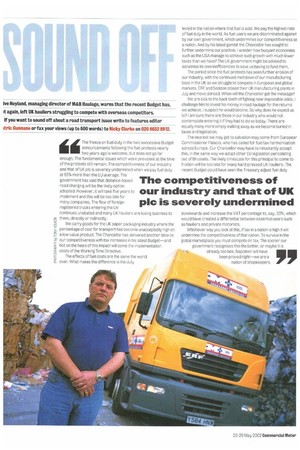lye Hoyiand, managing director of MdsB Haulage, warns that the
Page 48

If you've noticed an error in this article please click here to report it so we can fix it.
recent Budget has, d again, left UK hauliers struggling to compete with overseas competitors. If you want to sound off about a road transport issue write to features editor dric Cunnane or fax your views (up to 600 words) to NIcki Clarke on 020 8852 8912.
6 The freeze on fuel duty in the two successive Budget
announcements following the fuel protests nearly two years ago is welcome, but does not go far enough. The fundamental issues which were prevalent at the time of the protests still remain. The competitiveness of our industry and that of UK plc is severely undermined when we pay fuel duty at 65% more than the EU average. The government has said that distance-based road charging will be the likely option adopted. However, it will take five years to implement and this will be too late for many companies. The flow of foreignregistered trucks entering the UK continues unabated and many UK hauliers are losing business to EF, them, directly or indirectly.
,...,–, We carry goods for the UK paper packaging industry where the , percentage of cost for transport has become unacceptably high on z ,c2 a low-value product. The Chancellor has delivered another blow to -g" our competitiveness with tax increases in his latest Budget—and , a: hot on the heels of this impact will come the implementation ‹c
,6 costs of the Working Time Directive.
0 ,-The effects of fuel costs are the same the world 0 ,-The effects of fuel costs are the same the world 0
E over. What makes the difference is the duty
levied in the nation where that fuel is sold. We pay the highest rate of fuel duty in the world. As fuel users we are discriminated against by our own government, which undermines our competitiveness as a nation. And by his latest gambit the Chancellor has sought to further undermine our position. I wonder how buoyant economies such as the USA manage to achieve such growth with much lower taxes than we have? The UK government might be advised to scrutinise its own inefficiencies to save us having to fund them.
The period since the fuel protests has seen further erosion of our industry, with the continued meltdown of our manufacturing base in the UK as we struggle to compete in European and global markets. EPF and Seddon closed their UK manufacturing plants in July and move abroad. When will the Chancellor get the message?
We are sick to the back teeth of fighting near impossible odds. I challenge him to invest his money in road haulage for the returns we achieve. I suspect he would decline. So why does he expect us to? I am sure there are those in our industry who would not contemplate entering it if they had to do so today. There are equally many more simply walking away as we become buried in taxes and legislation.
The nearest we may get to salvation may come from Europear Commissioner Palacio, who has called for fuel tax harmonisation across Europe. Our Chancellor may have to reluctantly accept this, in the same way we adopt other EU legislation percolating out of Brussels. The likely timescale for this principal to come to fruition will be too late for many hard-pressed UK hauliers. The recent Budget could have seen the Treasury adjust fuel duty downwards and increase the VAT percentage to, say, 20%, which would have created a differential between essential users such as hauliers and private motorists.
Whichever way you look at this, if tax in a nation is high it MI undermine the competitiveness of that nation. To survive in the global marketplace you must compete on tax. The sooner our government recognises this the better, or maybe it is already too late. Napoleon will have been proved right—we are a nation of shopkeepers.




















































































































































